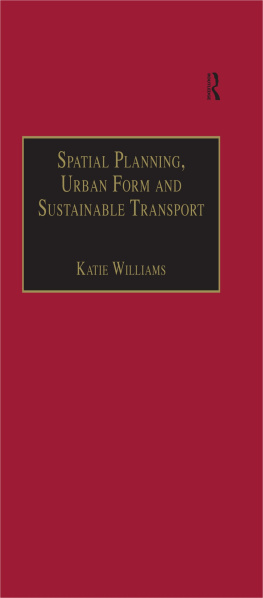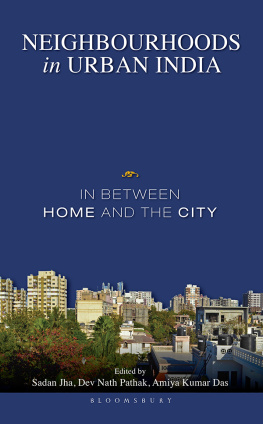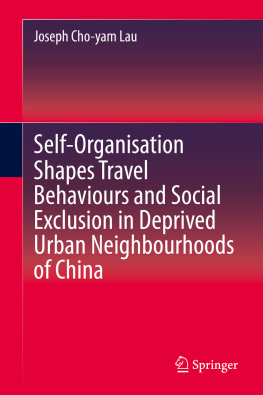REVITALISING DEPRIVED URBAN NEIGHBOURHOODS
For Toby
Revitalising Deprived Urban Neighbourhoods
An assisted self-help approach
Colin C. Williams
Department of Geography, University of Leicester
Jan Windebank
Department of French Studies, University of Sheffield
First published 2001 by Ashgate Publishing
Published 2016 by Routledge
2 Park Square, Milton Park, Abingdon, Oxon OX14 4RN
711 Third Avenue, New York, NY 10017, USA
Routledge is an imprint of the Taylor & Francis Group, an informa business
Copyright Colin C. Williams and Jan Windebank 2001
All rights reserved. No part of this book may be reprinted or reproduced or utilised in any form or by any electronic, mechanical, or other means, now known or hereafter invented, including photocopying and recording, or in any information storage or retrieval system, without permission in writing from the publishers.
Notice:
Product or corporate names may be trademarks or registered trademarks, and are used only for identification and explanation without intent to infringe.
British Library Cataloguing in Publication Data
Williams, Colin C., 1961
Revitalising deprived urban neighbourhoods : an assisted self-help approach. - (Urban and regional planning and development)
1.Urban renewal 2.Urban renewal - Citizen participation
I.Title II.Windebank, Jan
307.3'416
Library of Congress Control Number: 2001091556
ISBN 13: 978-0-7546-1482-1 (hbk)
ISBN 13: 978-1-138-25805-1 (pbk)
The origins of this book lie in a study of informal economic activity in deprived urban neighbourhoods. The Joseph Rowntree Foundation supported this project as part of its programme of research and innovative development projects, which it hopes will be of value to policy makers and practitioners. The facts presented and views expressed in this book, however, are those of the authors and not necessarily those of the Foundation. Gratitude is expressed by the authors to both the Joseph Rowntree Foundation for funding this project and to Stephen Hughes for providing the research assistance to bring it to fruition.
The comparative material on affluent suburbs meanwhile, was gathered through a research project conducted for the European Commission under its Targeted Socio-Economic Research (TSER) programme entitled Inclusion Through Participation (INPART). In this regard, we would like to thank Rik: Van Berkel of Utrecht University, as well as Maurice Roche, Jo Cooke and Claire Ainesley, our UK collaborators.
The material in moreover, was collected under an Economic and Social Research Council (ESRC) grant (R000237208) to evaluate LETS as a means of tackling social exclusion. Without the collaboration of Theresa Aldridge, Roger Lee, Andrew Leyshon, Nigel Thrift and Jane Tooke on this project, this chapter could not have been written.
There are in addition, many individuals who have contributed to this book in indirect ways such as through their comments at conferences and seminars where papers have been presented or during informal meetings to discuss the ideas. In this regard, we would like to thank those people in HM Treasury, DETR and the Political Economy Research Centre, as well as those attending seminars of the Citizens Income Trust, the Social Exclusion and Development of European Citizenship (SEDEC) Network, Urban & Regional Economics Seminar Group, Local Economy Policy Unit and the RGS/IBG Economic Geography Research Group, who provided valuable feedback on ideas.
Finally, Colin Williams would like to thank the University of Leicester for granting him study leave to complete the book. As always however, the usual disclaimers apply.
Introduction
In the past year, our comprehensive strategy to help those who can to help themselves, while providing support for those who most need it, has begun to take shape... Tackling social exclusion is not just about handouts, or public spending. It is about giving people, and communities, the means to help themselves (Tony Blair, 1998, p.26).
Old Labour is the idea that you did things to people, New Labour is about enabling people to do things for themselves (David Blunkett, cited in Hughes, 1998, p.6).
As these quotes from the Prime Minister of the UK and his Secretary of State for Employment and Education display, the UK government has undergone an institutional turn. The espousal of self-help has become a modem-day mantra. Across all government departments, policy documents have started to explore how self-help can be used to achieve their objectives (e.g., DETR, 1998; DfEE, 1999; DSS, 1999; Home Office, 1999; Social Exclusion Unit, 1998, 2000). This institutional turn, however, is neither confined to New Labour nor is it occurring only within the UK. Wherever one looks in the advanced economies, the traditional authoritarian approach that sought to socially engineer populations by doing things to them and 'disciplining' them is receding from view. In its place is emerging an approach founded upon an as yet ill-defined principle of 'self-discipline' in which people are being enabled to do things for themselves.
For UK commentators, this self-help approach is perhaps most clearly seen in arenas of social policy such as health, pensions or education. In the field of health care, there is an institutional turn towards preventative rather than curative medicine; in the sphere of education the turn is towards lifelong and informal learning, and in retirement planning towards personal pension provision. Up until now, however, it is not clear what the implications are of adopting such an approach when pursuing the revitalisation of deprived urban neighbourhoods. Many involved in urban regeneration and beyond are somewhat suspicious of the implications of adopting a self-help approach and there is little clarity about the form such an approach would take if it were to be adopted. Here, therefore, our objective is to start to shed some light on how self-help could be applied to the revitalisation of deprived urban neighbourhoods. To do this, first, we outline the rationales for using such an approach and second, what it would mean in policy terms if such an approach were to be adopted.
So far, few have attempted to address these issues. Some tentative first steps to explore a new role for self-help in the context of deprived urban neighbourhoods can be found in the report by the Social Exclusion Unit's Policy Action Team no. 9 entitled Community Self-Help (Home Office, 1999). In addition, there are tentative stabs at espousing a new role for self-help by those who are seeking to clarify what is meant by the 'third way' approach (e.g., Beck, 2000; Giddens, 1998, 2000). For the most part, however, there is a rather more negative response. The perception of most commentators is a general wariness of anybody espousing self-help (see, for example, Eisenschitz, 1997). Unwilling to think beyond the fullemployment/comprehensive welfare state scenario, their tendency is to interpret the espousal of self-help as an attempt to roll back the welfare state and diminish citizens' rights. As will be shown throughout this book however, interpreting self-help in this manner is not only grounded in dangerous 'golden age' thinking that seeks the return of an era that never actually existed but misrepresents the motives of those seeking to forge a new social model for the twenty-first century.






